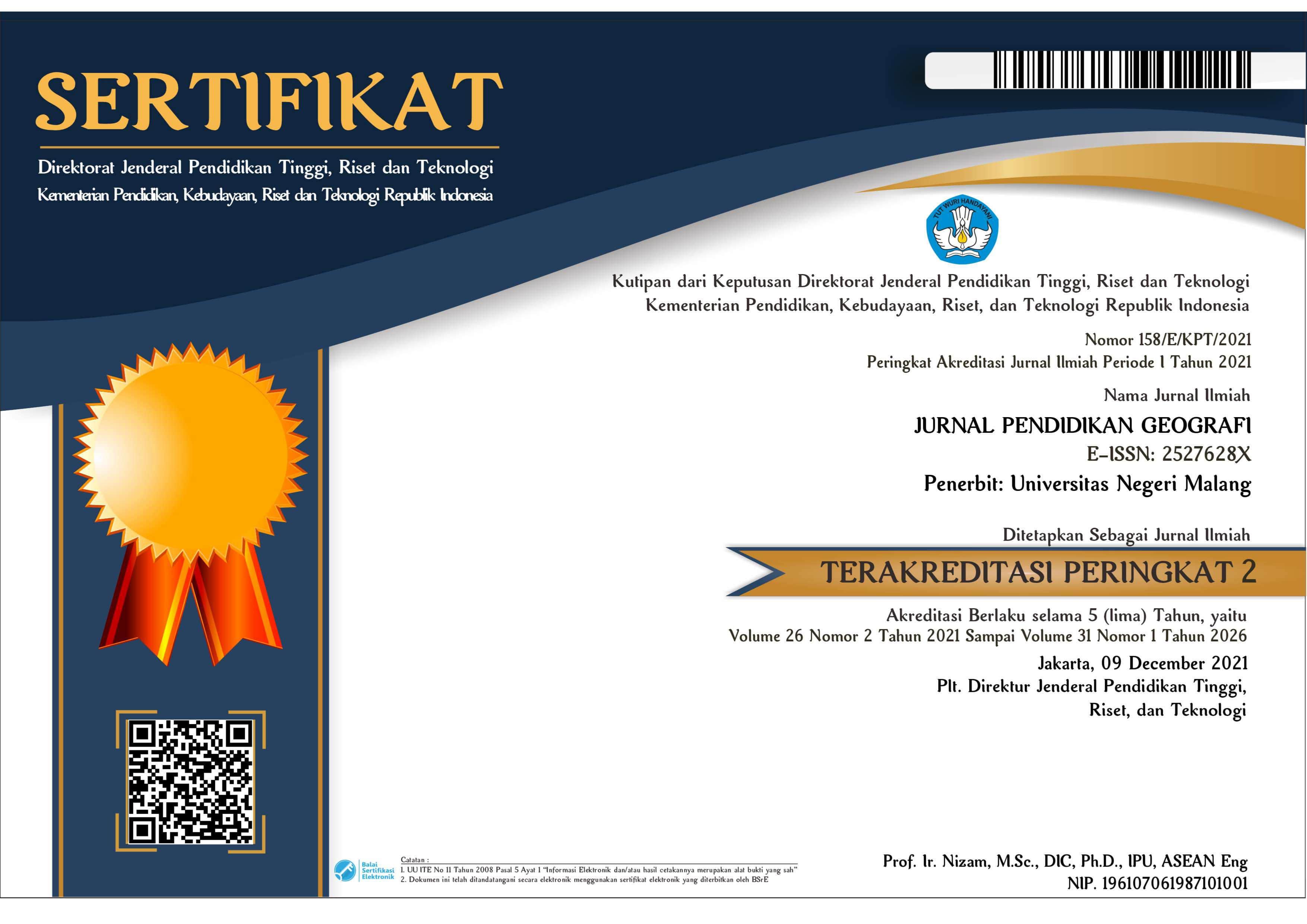Patorani local knowledge system in fisheries resources conservation education in Galesong District South Sulawesi
Abstract
Keywords
Full Text:
PDFReferences
Arief, A. A., & Agusanty, H. (2013). Inventarisasi pengetahuan tradisional masyarakat nelayan dalam pemanfaatan sumberdaya perikanan di Kabupaten Takalar (studi kasus Desa Tamasaju, Kecamatan Galesong Utara). Fakultas Ilmu Kelautan dan Perikanan Unhas, Makassar.
Baruah, D., Dutta, A., & Pravin, P. (2013). Traditional fish trapping devices and methods in the Brahmaputra Valley of Assam. Indian Journal of Traditional Knowledge, 12(1), 123–129.
Central Bureau of Statistics of Takalar Regency. (2019). Kabupaten Takalar dalam Angka 2019. Takalar: Central Bureau of Statistics of Takalar Regency.
Chakravartty, P., & Sharma, S. (2013). Different types of fishing gears used by the fishermen in Nalbari District of Assam. International Journal of Social Science & Interdisciplinary Research, 2(3), 177–191.
Danielsen, F., Topp-Jørgensen, E., Levermann, N., Løvstrøm, P., Schiøtz, M., Enghoff, M., & Jakobsen, P. (2014). Counting what counts: Using local knowledge to improve Arctic resource management. Polar Geography, 37(1), 69–91.
Hasriyanti, H. (2022). Pendidikan konservasi melalui budaya patorani berdasarkan sudut pandang ilmu Geografi. JPIG (Jurnal Pendidikan dan Ilmu Geografi), 7(1), 11–21. https://doi.org/10.21067/-jpig.v7i1.6668
Hasriyanti, H, Fatchan, A., Sumarmi, S., & Astina, I. K. (2016). Existence of tradition patorani activities in coastal resources conservation in the District Takalar South Sulawesi Province Indonesia. IOSR Journal of Humanities and Social Science (IOSR-JHSS), 21(10), 49–56. https://doi.org/10.9790/0837-2110094956
Hasriyanti, H., & Syarif, E. (2021). Strategi pemberdayaan sumber daya laut melalui kearifan lokal sistem punggawa-sawi di Desa Palalakkang Kecamatan Galesong Kabupaten Takalar. Jurnal Environmental Science, 3(2), 171–182. Retrieved from https://ojs.unm.ac.id/JES/article/view/20096/10770
Joa, B., Winkel, G., & Primmer, E. (2018). The unknown known–A review of local ecological knowledge in relation to forest biodiversity conservation. Land Use Policy, 79, 520–530.
Maridi, M. (2015). Mengangkat budaya dan kearifan lokal dalam sistem konservasi tanah dan air. Seminar Nasional XII Pendidikan Biologi UNS, (1), 20–39. Surakarta: UNS (Sebelas Maret University).
Martin, E., Suharjito, D., Darusman, D., Sunito, S., & Winarno, B. (2016). Traditional institution for forest conservation within changing community: Insight from the case of upland South Sumatra. Komunitas International Journal of Indonesian Society and Culture, 8(2), 236–249.
Ministry of Maritime Affairs and Fisheries. (2014). Laporan kinerja Kementerian Kelautan dan Perikanan Republik Indonesia. Jakarta: Ministry of Maritime Affairs and Fisheries.
Nguyen, T. H., & Ross, A. (2017). Barriers and opportunities for the involvement of indigenous knowledge in water resources management in the Gam River Basin in North-East Vietnam. Water Alternatives, 10(1), 134–159.
Norken, I. N., Suputra, I. K., & Arsana, I. G. N. K. (2016). Challenges to the Conservation of Subak System as World Cultural Heritage in Bali. Journal of Agricultural Science and Technology B, 6(2016), 215–225.
Patiselano, F., Manusawai, J., Arobaya, A., & Manusawai, H. (2015). Pengelolaan dan konservasi satwa berbasis kearifan tradisional di Papua.
Reyes-García, V., & Benyei, P. (2019). Indigenous knowledge for conservation. Nature Sustainability, 2(8), 657–658.
Setyowati, D. L., Juhadi, J., & Kiptida’iyah, U. (2017). Konservasi Mata Air Senjoyo melalui peran serta masyarakat dalam melestarikan nilai kearifan lokal. Indonesian Journal of Conservation, 6(1), 36–43.
Sufia, R., Sumarmi, S., & Amirudin, A. (2016). Kearifan lokal dalam melestarikan lingkungan hidup (studi kasus masyarakat adat Desa Kemiren Kecamatan Glagah Kabupaten Banyuwangi). Jurnal Pendidikan: Teori, Penelitian, dan Pengembangan, 1(4), 726–731.
Sumarmi, S. (2015). Local wisdom of Osing people in conserving water resources. Komunitas: International Journal of Indonesian Society and Culture, 7(1), 43–51.
Syarif, E., Hasriyanti, H., Fatchan, A., Astina, I. K., & Sumarmi, S. (2016). Conservation values of local wisdom traditional ceremony Rambu Solo Toraja’s tribe South Sulawesi as efforts the establishment of character education. EFL JOURNAL, 1(1), 17–23.
Tamba, I. M. (2011). Kontribusi kearifan lokal terhadap konservasi lahan kritis. Jurnal Agrimeta, 1(01), 89757.
Thamrin, H. (2013). Kearifan lokal dalam pelestarian lingkungan (the lokal wisdom in environmental sustainable). Kutubkhanah, 16(1), 46–59.
Thompson, K. L., Lantz, T., & Ban, N. (2020). A review of indigenous knowledge and participation in environmental monitoring. Ecology and Society, 25(2), 10.
Thondhlana, G., & Shackleton, S. (2015). Cultural values of natural resources among the San people neighbouring Kgalagadi Transfrontier Park, South Africa. Local Environment, 20(1), 18–33.
Vogt, N., Pinedo-Vasquez, M., Brondízio, E. S., Rabelo, F. G., Fernandes, K., Almeida, O., … Dou, Y. (2016). Local ecological knowledge and incremental adaptation to changing flood patterns in the Amazon delta. Sustainability Science, 11(4), 611–623.
DOI: http://dx.doi.org/10.17977/um017v28i12023p52-63
Refbacks
- There are currently no refbacks.
Copyright (c) 2023 Jurnal Pendidikan Geografi: Kajian, Teori, dan Praktek dalam Bidang Pendidikan dan Ilmu Geografi

This work is licensed under a Creative Commons Attribution-ShareAlike 4.0 International License.
Jurnal Pendidikan Geografi: Kajian, Teori, dan Praktek dalam Bidang Pendidikan dan Ilmu Geografi is licensed under Creative Commons Attribution-ShareAlike 4.0 International License,
JPG Indexed By:
View My Stats









12.png)
